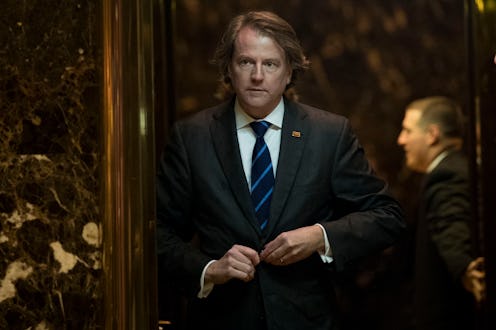News
Trump's New White House Counsel Faces A Tough Job
President-elect Donald Trump has tapped Donald F. McGahn to be his White House counsel, his transition team announced Friday. A seasoned political lawyer and former chairman of the Federal Election Commission, McGahn faces a tough task in helping the president-elect maneuver mounting concerns over the growing list of potential conflicts of interest Trump's businesses pose to his presidency. But with the chief ethics counsels of two past presidents calling for Trump to sell his company, will McGahn force Trump to make a deal?
Although McGahn has yet to comment on how he plans to handle Trump's potential conflicts of interest, incoming chief of staff Reince Priebus promised CNN the president-elect's White House counsel would ensure there were no conflicts of interest when Trump takes office. "We will have our White House counsel review all of these things," Priebus said in an interview Nov. 20. "We will have every 'i' dotted and every 't' crossed."
In an effort to avoid any potential conflicts of interest Trump has said he plans on shifting control — but not ownership — of his company to his adult children. But many experts say that's not enough.
According to ThinkProgressed, top ethics lawyers for both President Barack Obama and President George W. Bush have said they feel Trump's vast business interests represented huge conflicts of interest and could potentially violate the Constitution's Emoluments clause. They argued the Electoral College should not vote Trump in as president unless he sells his businesses and places the revenue in a truly blind trust ahead of their Dec. 19 vote.
Yet selling off his companies is not an idea that appears to have sat well with the president-elect. "In theory, I could run my business perfectly, and then run the country perfectly," Trump said during an interview with the New York Times last week. "The law is totally on my side, meaning the president can't have a conflict of interest," he said when questioned about the long list of potential conflicts of interest his business dealings stood to bring to his presidency.
He went on to say: "I don't have to do anything, but I want to do something if I can. If there is something." But when pressed about the option of selling his company outright, Trump appeared to dismiss the idea. "That's a very hard thing to do, you know what, because I have real estate... selling real estate isn't like selling stock. Selling real estate is much different, it's in a much different world."
Given Trump's apparent unwillingness to dig into discussions on the viability of selling his company in an effort to avoid potential conflicts of interest, it seems unlikely that McGahn would be able to make him sell off his vast business interests between now and next year. Which means, McGahn may find he really has his work cut out for him over the next four years.
